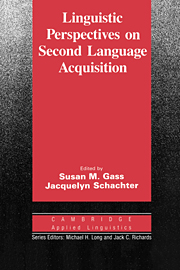Book contents
- Frontmatter
- Contents
- List of contributors
- Series editors' preface
- Introduction
- I THEORIES OF ACQUISITION
- II SYNTAX
- Chapter 3 Testing a proposed universal
- Chapter 4 The role of the head-initial/head-final parameter in the acquisition of English relative clauses by adult Spanish and Japanese speakers
- Chapter 5 On some properties of the “pro-drop” parameter: looking for missing subjects in non-native Spanish
- Chapter 6 The adjacency condition on case assignment: do L2 learners observe the Subset Principle?
- III SEMANTICS/PRAGMATICS
- IV LEXICON
- V PHONOLOGY
- Index
Chapter 3 - Testing a proposed universal
Published online by Cambridge University Press: 05 October 2012
- Frontmatter
- Contents
- List of contributors
- Series editors' preface
- Introduction
- I THEORIES OF ACQUISITION
- II SYNTAX
- Chapter 3 Testing a proposed universal
- Chapter 4 The role of the head-initial/head-final parameter in the acquisition of English relative clauses by adult Spanish and Japanese speakers
- Chapter 5 On some properties of the “pro-drop” parameter: looking for missing subjects in non-native Spanish
- Chapter 6 The adjacency condition on case assignment: do L2 learners observe the Subset Principle?
- III SEMANTICS/PRAGMATICS
- IV LEXICON
- V PHONOLOGY
- Index
Summary
Background
About 20 years ago, the fledgling field of second language acquisition research received considerable impetus from the suggestion by S. P. Corder, that although there may be differences in such factors as previous knowledge, motivation, and so forth, the processes of child first and adult second language acquisition may very well be the same. “Let us say,” he argued, that “given motivation, it is inevitable that a human being will learn a second language if he is exposed to the language data” (1967:166).
More recently, the question of how the process of second language acquisition is best accounted for has been reformulated by several linguists interested in exploring the implications of the currently evolving linguistic theory known as Universal Grammar (UG). As is well known, UG is viewed as a theory designed to account in part for an adult's mature grammatical competence. It is also a theory consistent with what are known to be the general facts of child first language acquisition. Grammatical theory, according to UG proponents, is developed in the context of this remarkable feat of children and is meant to be a partial explanation of it. If one were convinced that the claims of Corder and many others who have followed this line of thinking are correct, that the processes of second language acquisition are essentially those of first language acquisition, then it would seem reasonable that the next step would be to explore, within the UG framework, the possibilities of finding further similarities in first and second language acquisition, and, even better, explanations for them.
- Type
- Chapter
- Information
- Linguistic Perspectives on Second Language Acquisition , pp. 73 - 88Publisher: Cambridge University PressPrint publication year: 1989
- 62
- Cited by



